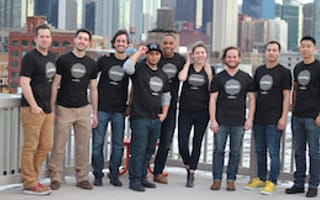
The early stages of building a company are all about scrappiness. Finding ways to cut down on spending or discovering new revenue streams can make the difference between being able to bring on another employee or not —and what startup couldn’t use a few more hands?
To Hunter Riley, co-founder and CEO of small freight logistics startup Schlep, staying lean has been front of mind since the beginning. Understanding that many startups fail because they outspend their runway, Riley and his co-founders decided to forgo expenses other startups might deem essential — like building the company’s tech product.
“We didn’t start with a CTO,” said Riley. “We knew that the company was not reliant on a technology platform to exist — it was only reliant on a technology platform to scale. So we put ourselves into a position where we could build this business prior to having a real technology platform.”
Although always envisioned as a technology startup, the company’s first “platform” was a Squarespace website where users submitted service requests through a simple web form. The startup’s team would then manually match each request with drivers, managing orders and “schleppers” with a hodgepodge of spreadsheets, emails and text messages.
This "fake it until you make it" approach to technology allowed Schlep to get a feel for the business and determine what their tech product should look like before sinking money into a prototype.
Needless to say, the team breathed a deep sigh of relief when the company’s technology platform came together. Although the process of managing a fleet by hand can feel cumbersome for a business looking to scale like a startup, Riley said the early stages of operating more like a non-tech logistics provider opened his eyes to opportunities and pain points he might not otherwise have discovered.
After researching the costs of acquiring one-off customers through advertising and promotions, Riley and his team decided that the “Uber for moving” business model would prove untenable for a business looking to scale. Instead, they dedicated a lot of time to developing business relationships with antique dealers, furniture stores and other businesses who frequently need to transport large or heavy items short distances at short notice, providing Schlep with a reliable revenue stream.
In the early days, the company even covered its bills by offering short-term storage in its warehouse as an add-on for customers who had purchased large items and were unable to receive them immediately: “We can just set it aside, wrapped, and make five dollars a night off of it,” Riley said. “For us, that pays our rent.”
Riley equates this unofficial short-term storage offering to urban dwellers putting their apartments or spare bedrooms up for rent on Airbnb.
By any measure, it appears that the eight-person team's scrappy approach is paying off. With its technology platform in place and more than 100 active, thoroughly vetted schleppers who drive for the company on a monthly basis, the company plans to launch in a second market, Milwaukee, at the beginning of next year.
“At that point we’ll have the revenue to fund another market launch and measure what the ROI is,” Riley said. “Because the first market, as we’ve seen and as we’ve always heard, takes a while to establish.”
Originally from Little Rock, Arkansas, Riley said Chicago made for a perfect test market for his company’s business model. But a first market will never be a true predictor for scalability, since many of the costs in a first market are one-time expenses associated with sorting out kinks in the business model. So the team will wait for the data from its second market launch before drawing a more extensive roadmap for expansion to other cities in the Midwest.
“We’ll measure the cost in Milwaukee, and go after more funding to expand to more markets after that,” Riley said.
Images via Schlep.
What's your company's story? Let us know with a tip or a tweet@BuiltInChicago.





.jpg)
